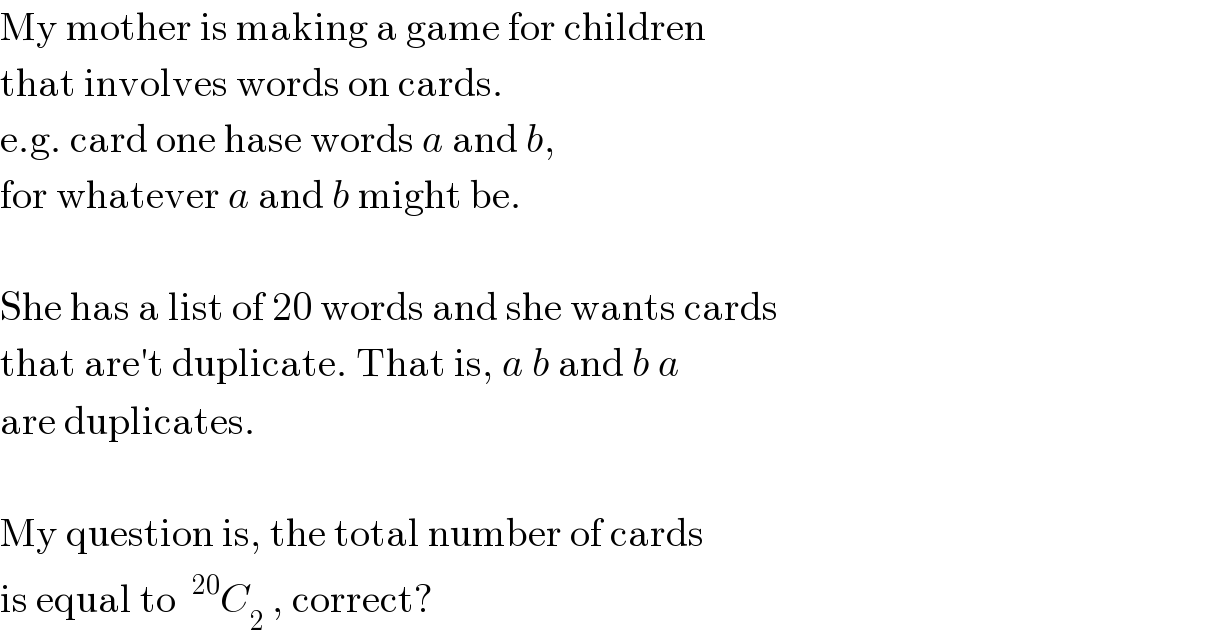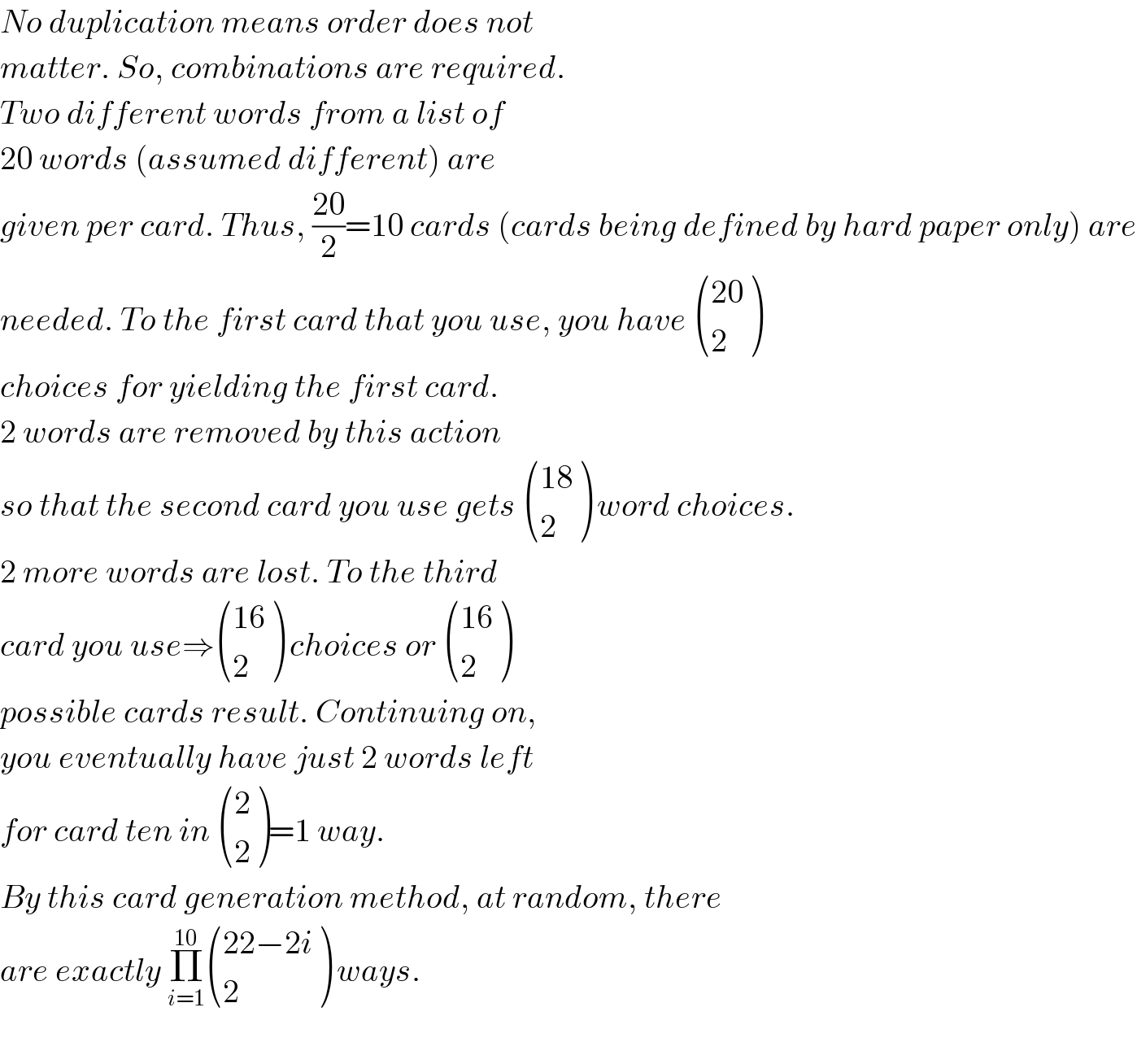Question Number 5315 by FilupSmith last updated on 07/May/16

$$\mathrm{My}\:\mathrm{mother}\:\mathrm{is}\:\mathrm{making}\:\mathrm{a}\:\mathrm{game}\:\mathrm{for}\:\mathrm{children} \\ $$$$\mathrm{that}\:\mathrm{involves}\:\mathrm{words}\:\mathrm{on}\:\mathrm{cards}. \\ $$$$\mathrm{e}.\mathrm{g}.\:\mathrm{card}\:\mathrm{one}\:\mathrm{hase}\:\mathrm{words}\:{a}\:\mathrm{and}\:{b}, \\ $$$$\mathrm{for}\:\mathrm{whatever}\:{a}\:\mathrm{and}\:{b}\:\mathrm{might}\:\mathrm{be}. \\ $$$$ \\ $$$$\mathrm{She}\:\mathrm{has}\:\mathrm{a}\:\mathrm{list}\:\mathrm{of}\:\mathrm{20}\:\mathrm{words}\:\mathrm{and}\:\mathrm{she}\:\mathrm{wants}\:\mathrm{cards} \\ $$$$\mathrm{that}\:\mathrm{are}'\mathrm{t}\:\mathrm{duplicate}.\:\mathrm{That}\:\mathrm{is},\:{a}\:{b}\:\mathrm{and}\:{b}\:{a} \\ $$$$\mathrm{are}\:\mathrm{duplicates}. \\ $$$$ \\ $$$$\mathrm{My}\:\mathrm{question}\:\mathrm{is},\:\mathrm{the}\:\mathrm{total}\:\mathrm{number}\:\mathrm{of}\:\mathrm{cards} \\ $$$$\mathrm{is}\:\mathrm{equal}\:\mathrm{to}\:\:^{\mathrm{20}} {C}_{\mathrm{2}} \:,\:\mathrm{correct}? \\ $$
Commented by Yozzii last updated on 07/May/16

$${No}\:{duplication}\:{means}\:{order}\:{does}\:{not} \\ $$$${matter}.\:{So},\:{combinations}\:{are}\:{required}. \\ $$$${Two}\:{different}\:{words}\:{from}\:{a}\:{list}\:{of} \\ $$$$\mathrm{20}\:{words}\:\left({assumed}\:{different}\right)\:{are}\: \\ $$$${given}\:{per}\:{card}.\:{Thus},\:\frac{\mathrm{20}}{\mathrm{2}}=\mathrm{10}\:{cards}\:\left({cards}\:{being}\:{defined}\:{by}\:{hard}\:{paper}\:{only}\right)\:{are} \\ $$$${needed}.\:{To}\:{the}\:{first}\:{card}\:{that}\:{you}\:{use},\:{you}\:{have}\:\begin{pmatrix}{\mathrm{20}}\\{\mathrm{2}}\end{pmatrix}\: \\ $$$${choices}\:{for}\:{yielding}\:{the}\:{first}\:{card}. \\ $$$$\mathrm{2}\:{words}\:{are}\:{removed}\:{by}\:{this}\:{action} \\ $$$${so}\:{that}\:{the}\:{second}\:{card}\:{you}\:{use}\:{gets}\:\begin{pmatrix}{\mathrm{18}}\\{\mathrm{2}}\end{pmatrix}\:{word}\:{choices}. \\ $$$$\mathrm{2}\:{more}\:{words}\:{are}\:{lost}.\:{To}\:{the}\:{third} \\ $$$${card}\:{you}\:{use}\Rightarrow\begin{pmatrix}{\mathrm{16}}\\{\mathrm{2}}\end{pmatrix}\:{choices}\:{or}\:\begin{pmatrix}{\mathrm{16}}\\{\mathrm{2}}\end{pmatrix}\: \\ $$$${possible}\:{cards}\:{result}.\:{Continuing}\:{on}, \\ $$$${you}\:{eventually}\:{have}\:{just}\:\mathrm{2}\:{words}\:{left} \\ $$$${for}\:{card}\:{ten}\:{in}\:\begin{pmatrix}{\mathrm{2}}\\{\mathrm{2}}\end{pmatrix}=\mathrm{1}\:{way}. \\ $$$${By}\:{this}\:{card}\:{generation}\:{method},\:{at}\:{random},\:{there} \\ $$$${are}\:{exactly}\:\underset{{i}=\mathrm{1}} {\overset{\mathrm{10}} {\prod}}\begin{pmatrix}{\mathrm{22}−\mathrm{2}{i}}\\{\mathrm{2}}\end{pmatrix}\:{ways}. \\ $$$$ \\ $$
